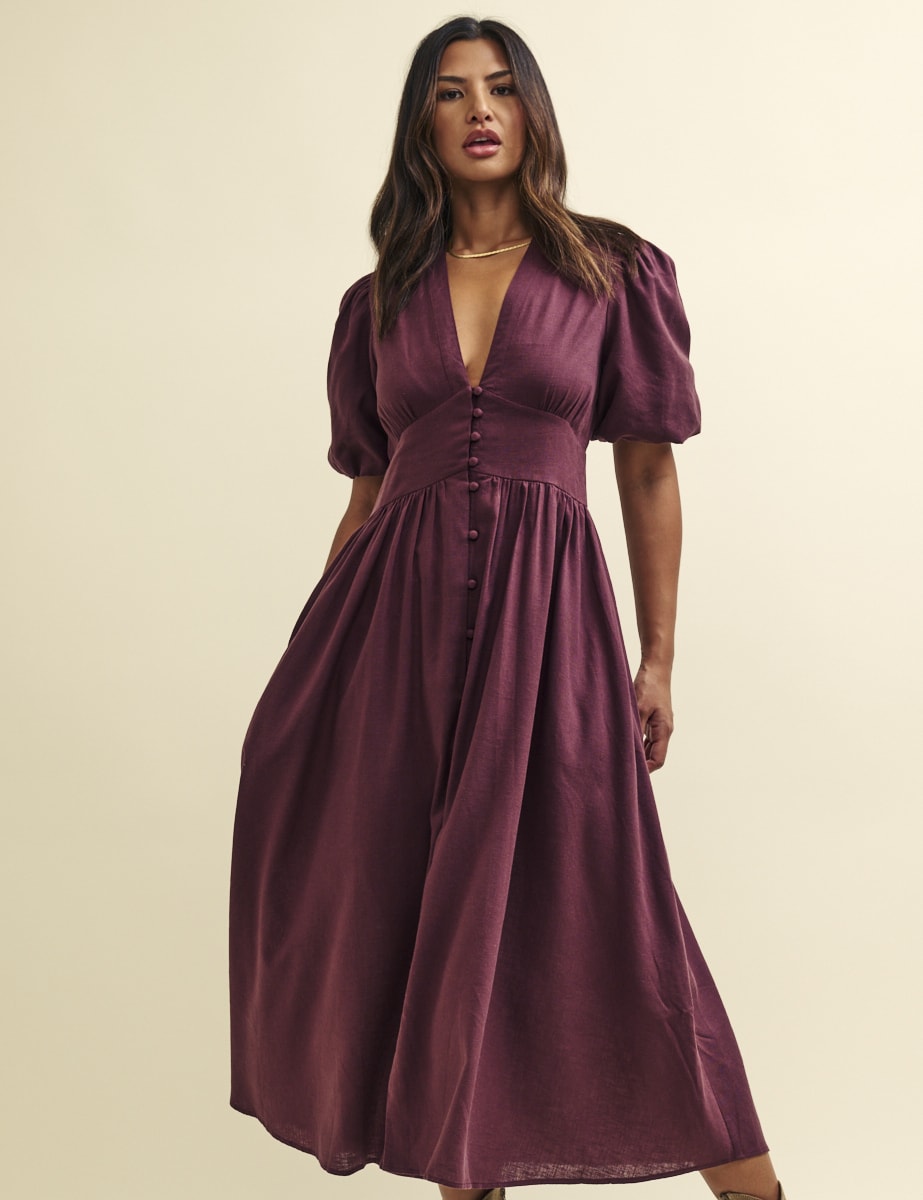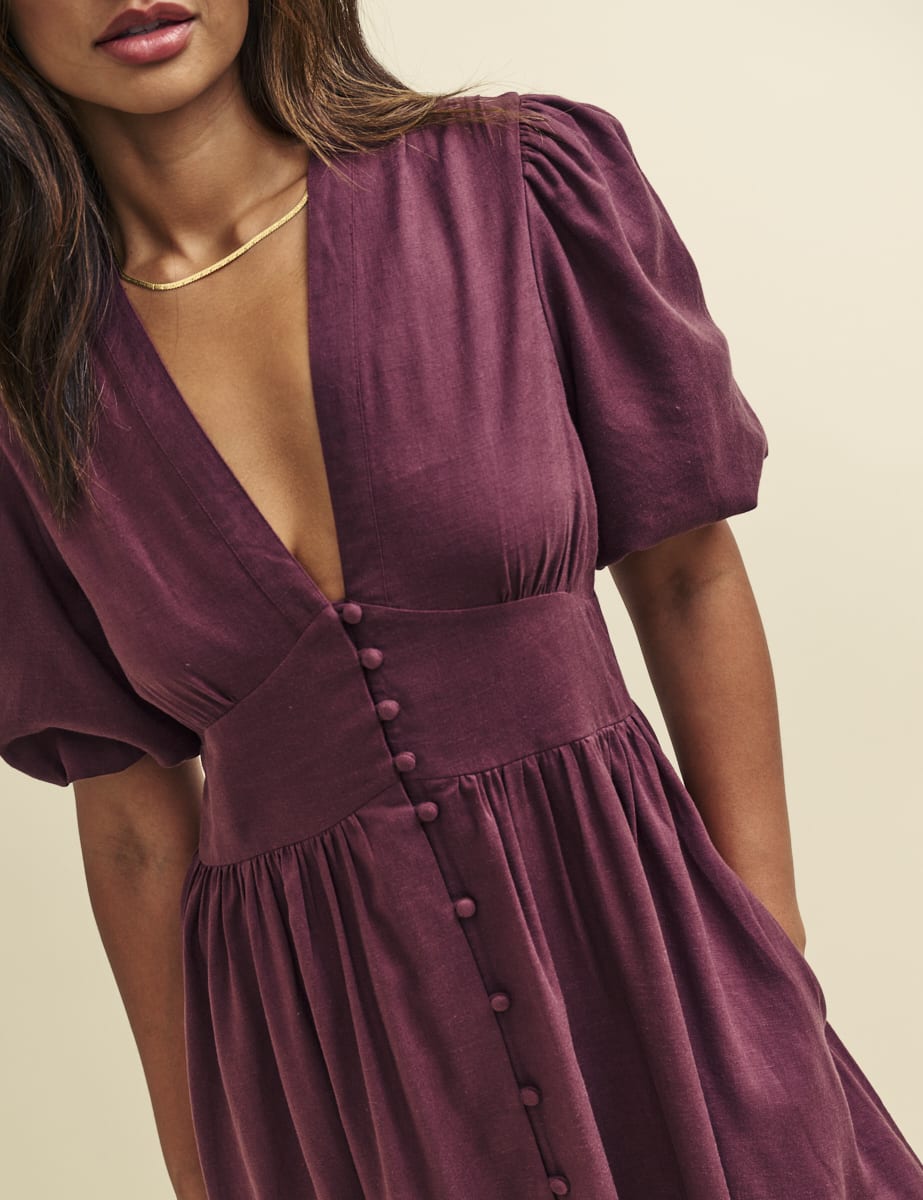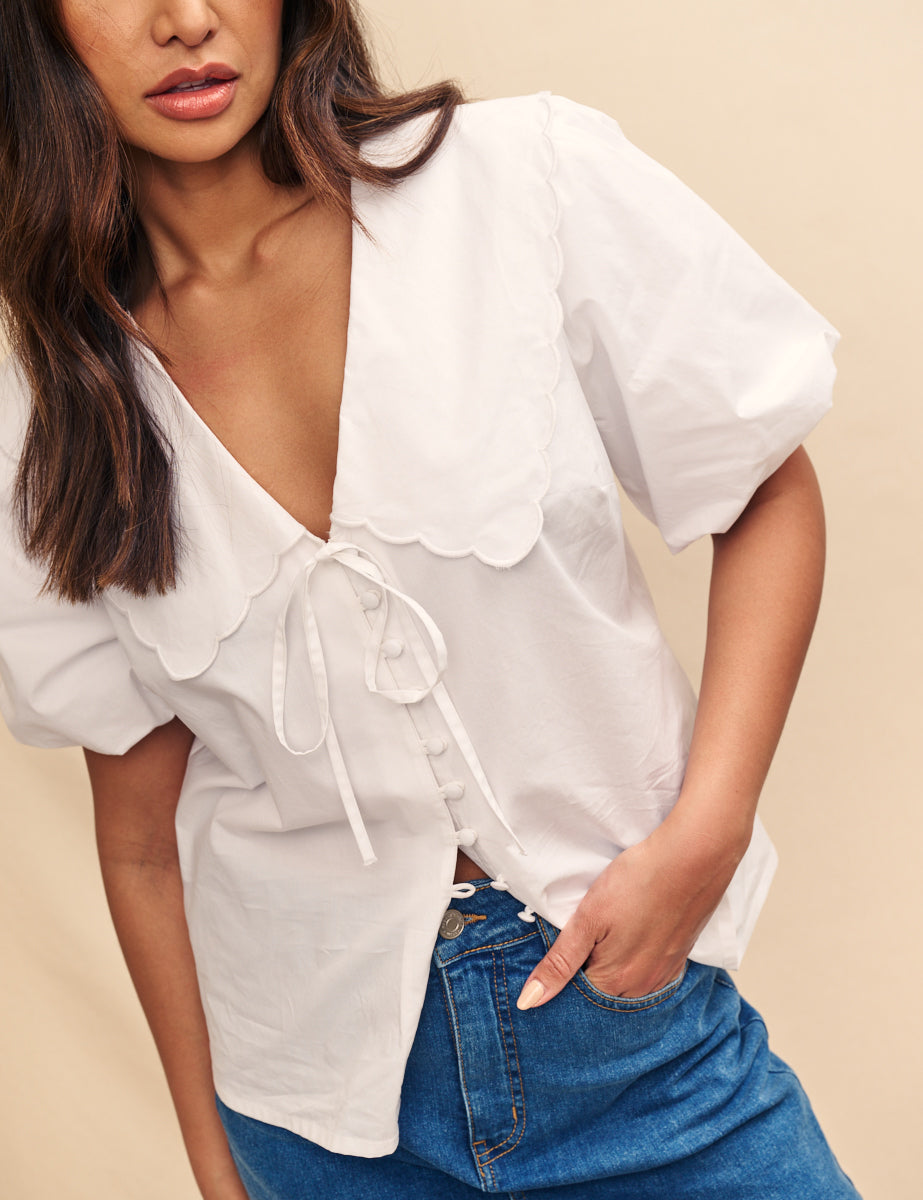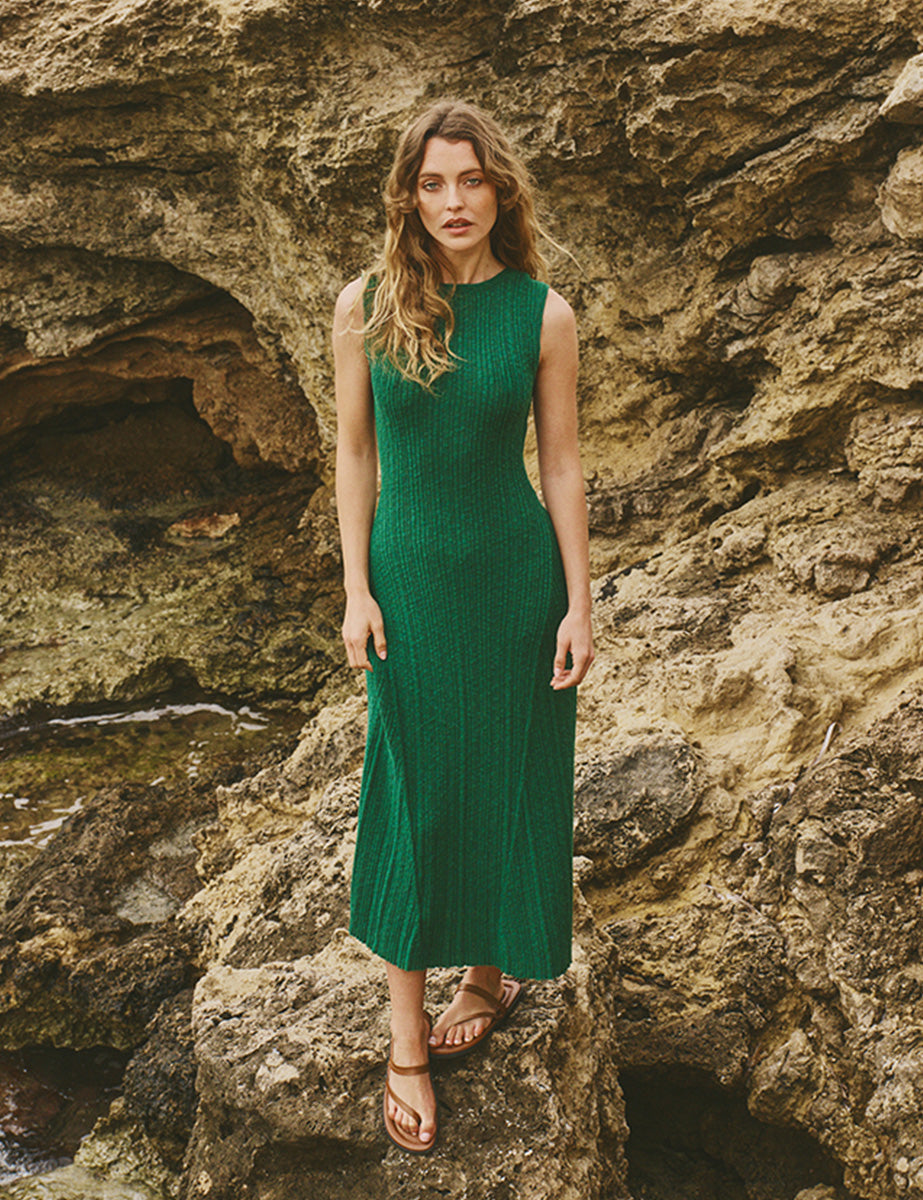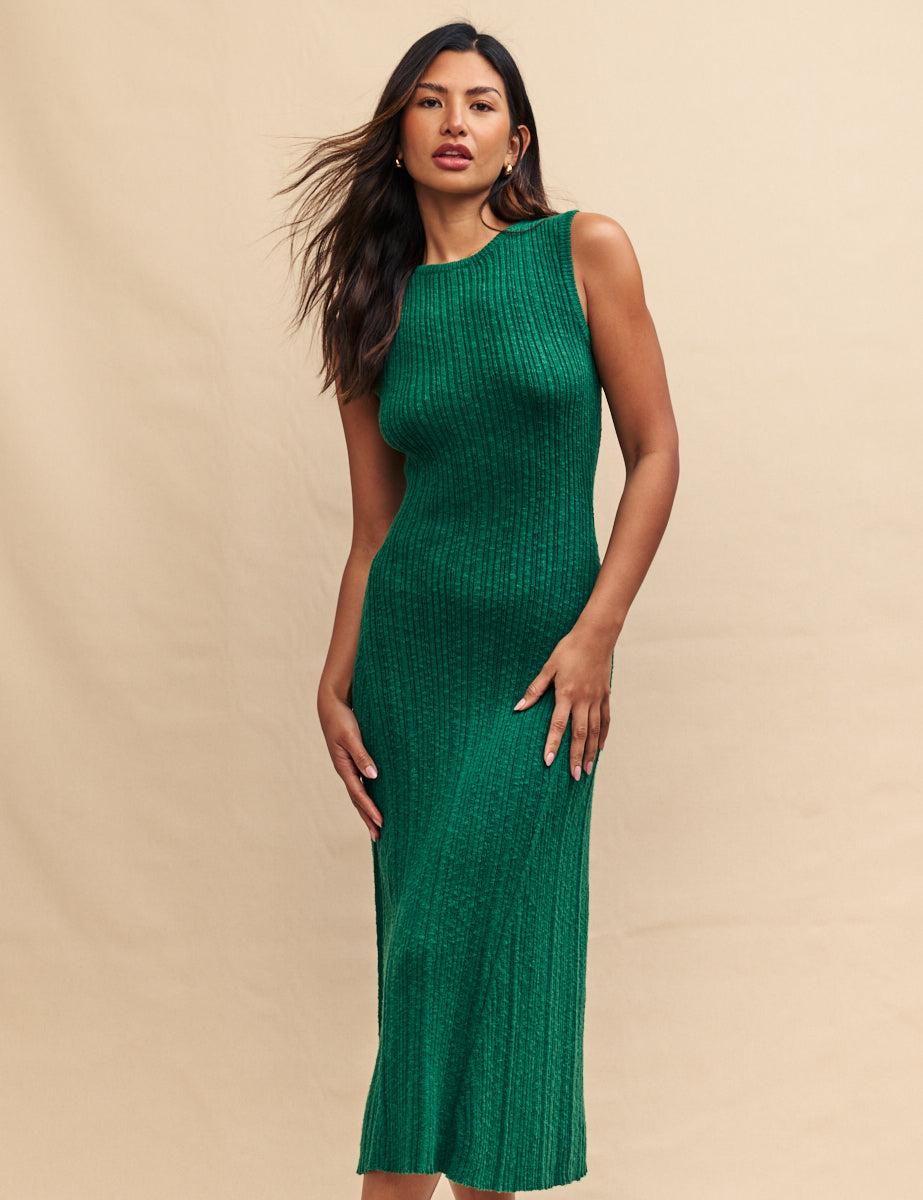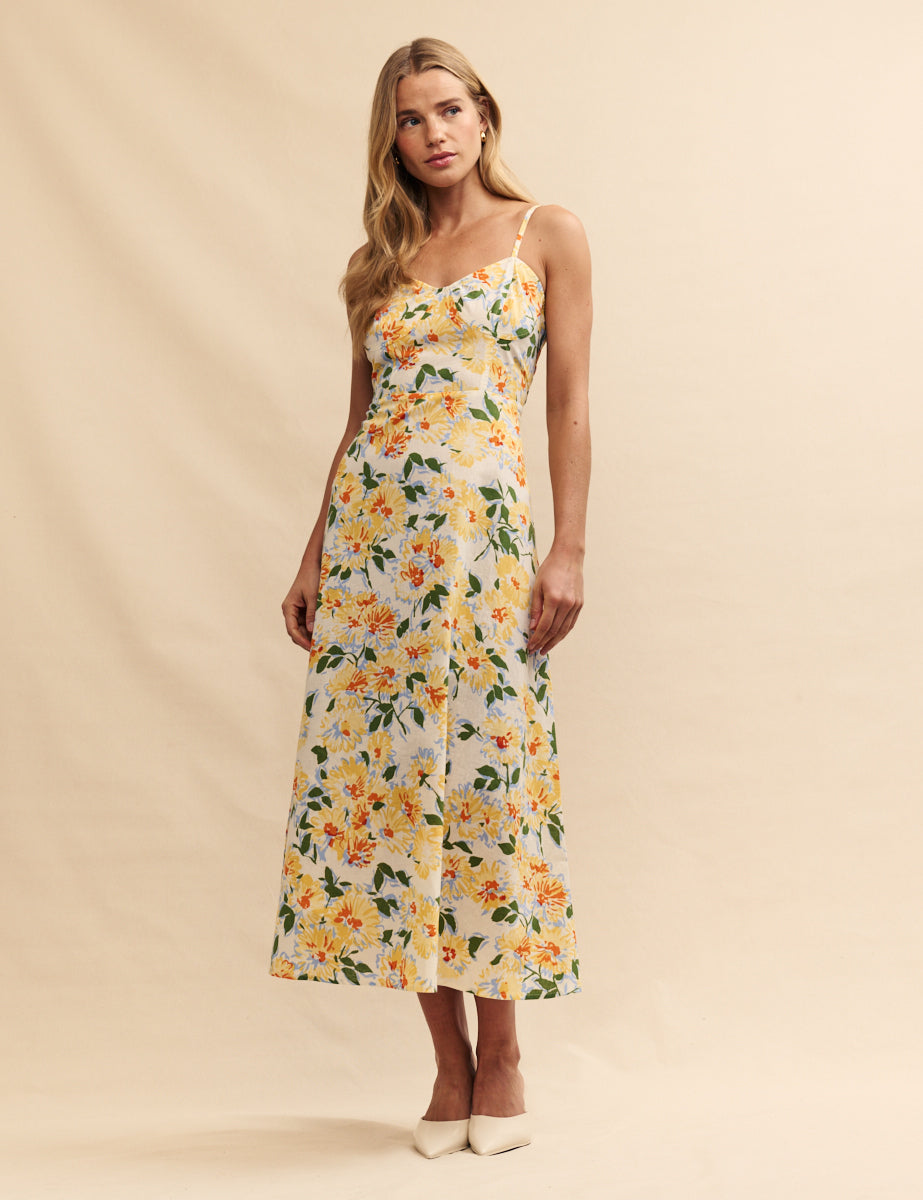
Product
Responsibility is in our fabric. When it comes to cleaning up fashion, material choice alone can account for up to 80% of a product’s social and environmental footprint. In 2021, we collaborated with industry experts from The Right Project to map out our Responsibility Roadmap.We’re proud to say that over 95% of our 2023 collection was made from responsible fabrics.
Our ambition is to create every collection from 100% responsible fabrics and we’re working hard to get there through the exploration of new materials and embracing textile innovation with key partners.
Here at Nobody’s Child, we have a positive vision for the future. We believe thoughtfully created clothes should be the rule, not the exception, and we’re dedicated to making responsible and affordable pieces, whilst being as transparent and honest as possible.
Our fabrics
We define a responsible fabric as one where at least 50% of the composition is certified as being recycled, organic or lower impact than traditional fabrics. Primarily, we have sought to find responsible alternatives to three of the most widely used materials in the fashion industry which have a negative footprint on the planet. These are cotton, polyester and viscose.
2022 saw us branch out from our core product range of predominantly dresses to athleisure, swimwear and tailoring. This brought challenges surrounding fabric choice which we’re proud to say we overcame. Categories such as knits and outerwear have added further complexity, as they’re often made from synthetic materials like acrylic and Nylon. Wherever possible, we seek to use recycled synthetics and we remain dedicated to reaching our target of every collection made from 100% responsible fabrics.
Cotton
Cotton is the most used fabric on Earth, accounting for over half of the world’s fibre needs. However, the use of conventional cotton has a negative impact on the planet through high water usage. It also uses more pesticides than any other crop.
Where we can, we use organic cotton. This creates healthy soil that locks in carbon and emits up to 46% fewer greenhouse gases than conventional cotton. Meanwhile, it requires up to 91% less water and doesn’t use harmful pesticides that leach into the environment. Its fibres are longer and stronger than conventional cotton so your clothes last longer. Our cotton is free from exploitation and we don’t source from Xinjiang, Turkmenistan or Uzbekistan.
Organic cotton only represents 1% of the total amount of cotton grown on the planet and therefore it’s in high demand. When we can’t secure organic cotton, we support the use of transitional. This is grown by farmers who are in the process of switching from traditional cotton farming methods to organic. The goal of transitional cotton is to create a more sustainable industry that benefits from both the environment and the people involved in its production.
We use cotton which falls into one of the following certifications: Global Organic Textile Standard (GOTS), Organic Cotton Standard 100 (OCS100), Fairtrade (by Flocert), Global Recycled Standard (GRS) and the BCI (Better Cotton Initiative).
We’re also working closely with our suppliers in Greece to utilise their supply of fully traceable, cotton which:
Uses blockchain to track its production
Originates from non-GMO cotton seeds
Promotes sustainable farming practices
Controls the use of water sources
In spring/summer 2023, 99% of our cotton was either organic, transitional or low impact (BCI/Greek) in comparison to 73% of cotton in 2022.
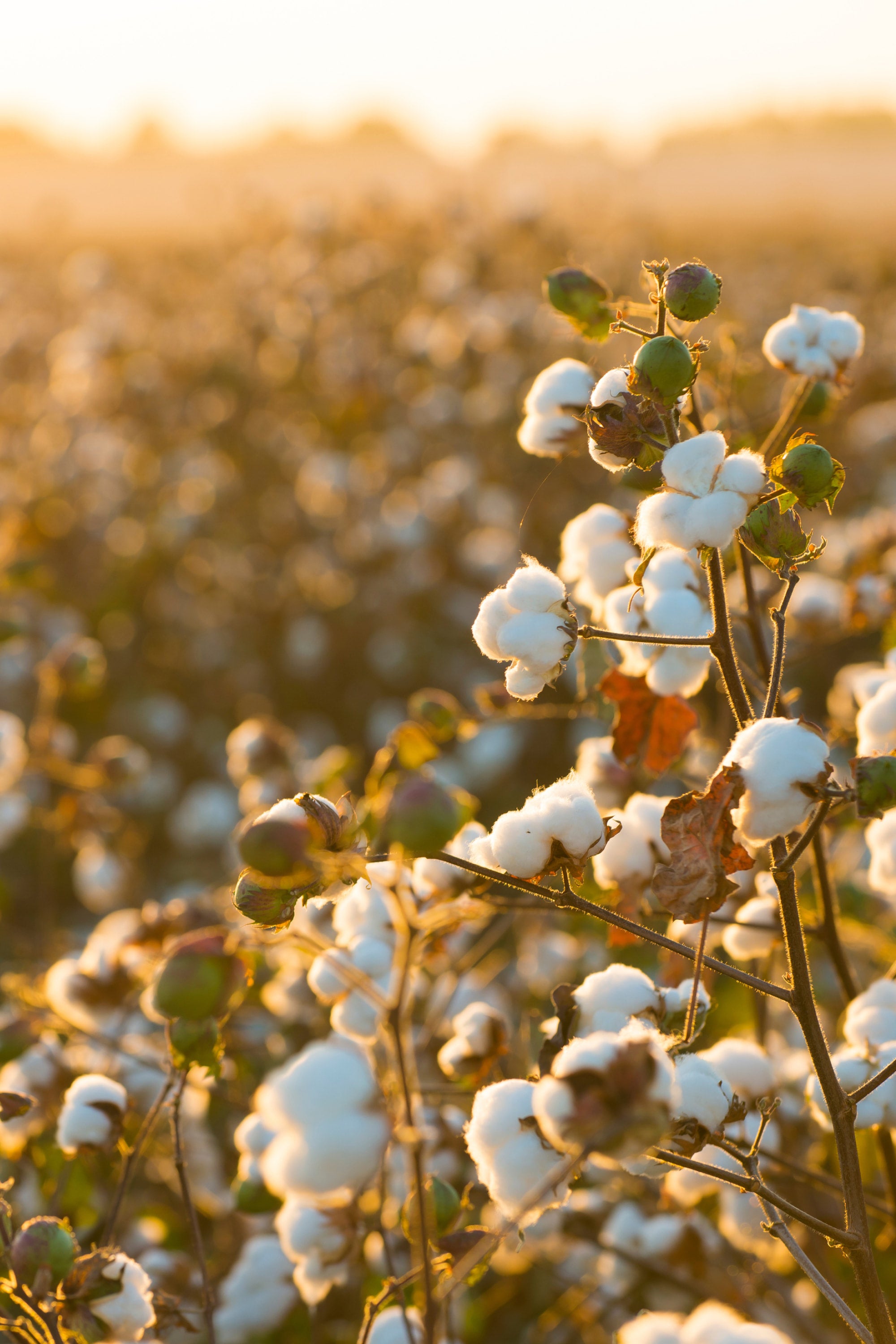
TENCEL™ Lyocell
We’ve recently incorporated TENCEL™ Lyocell into our mix as part of a strategic partnership with Lenzing Group. It’s sourced from sustainably managed forests and is biodegradable and compostable. The fibres are created using a unique, closed-loop production process meaning fewer emissions, less chemicals and greater

Recycled materials
Where we use synthetic fabrics, we seek out recycled fibres to reduce the creation of new materials from crude oil. Recycled polyester is obtained by melting down existing plastics and spinning it into a fibre. This gives a second life to material that’s not biodegradable and would otherwise inevitably end up in landfill or the ocean.
In 2023, 73% of our polyester was recycled, up from 55% in 2022. 100% of our athleisure range was made from recycled plastic bottles. A large mix of our swimwear collection is made using ECONYL® Regenerated Polyamide and REPREVE® Recycled Polyester, giving a second life to waste such as fishing nets, fabric scraps, carpet flooring and plastic bottles. This can be recycled indefinitely without losing its quality and also reduces the climate impact of Nylon by up to 90% compared to its conventional alternative.
We work with certifications including the Global Recycled Standard (GRS) and the Recycled Claim Standard (RCS). Where we can, we’re reducing the use of blended synthetic materials, making our products easier to recycle.

Viscose
Up from 77% in 2022, over 82% of the viscose used in our 2023 collection was responsible and sourced from well-managed forests, minimising water usage and ensuring traceability back to its origin. We’re working on the remaining 18% which is predominantly still blended with responsible viscose. Our use of LENZING™ ECOVERO™ and Livaeco™Birla Cellulose has allowed us to create clothing with a lower carbon and water footprint than traditional viscose.
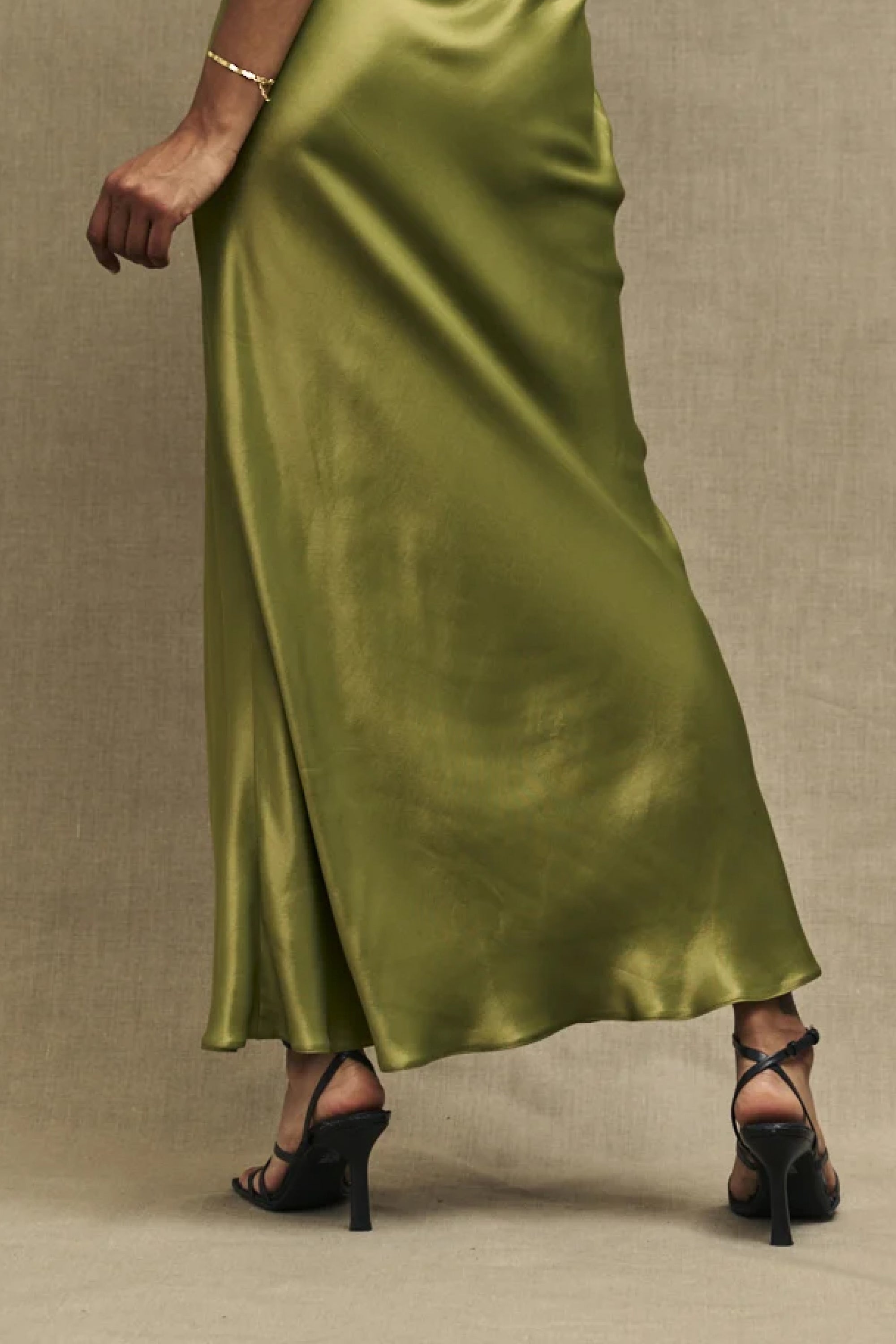
Denim
Whenever possible we use organic cotton to produce our denim garments. In additional to the benefits explained above we also use the Jeanologia’s Environmental Impact Measure (EIM) system to guide our Denim finishing practices. EIM helps us assess whether our efforts are leading to the desired reduction of environmental impact. EIM assesses:
• Water consumption
• Energy consumption
• Chemical product used
• Worker health
We also laser our NC Logo directly onto our jeans, using less fabric. We do not allow any non-functioning rivet or buttons.
We continue to work with our supplier Chottani, to improve our Denim offering.

Linen
SS23 saw the introduction of linen into our fabric mix. Linen is a natural fibre derived from the flax plant which grows quickly with little to no fertilisers or pesticides and has low water impact. When grown using responsible farming practices, flax naturally produces optimum soil quality. We accept linen that has been accredited to either Masters of Linen™ or European Flax™. Linen fabric is breathable, durable and has unique thermo-regulating properties meaning its wearable in both the summer and winter.
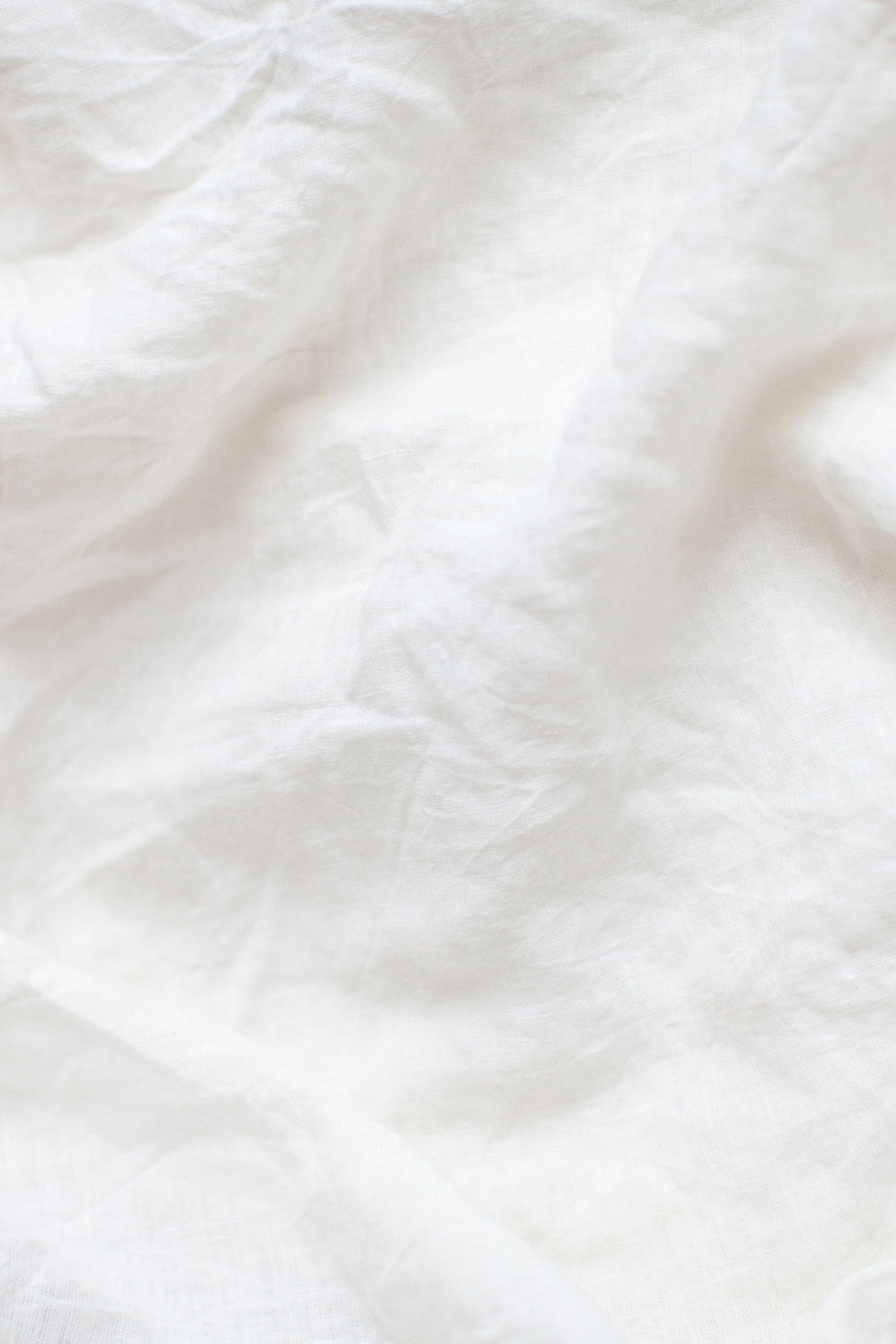
Merino Wool
We introduced merino wool into our fabric mix to offer an alternative option to knitted synthetics which are originally derived from fossil fuels and don’t biodegrade.
Wool is a natural fibre which is durable, breathable and biodegradable. Wool is also odor-resistant, which means it doesn’t need to be washed as often as other fibre, saving water and energy.
100% of the wool we use is certified to the Responsible Wool Standard (RWS) which aims to improve the welfare of the sheep and the land they graze on. Farmers must meet specific animal welfare, land management and social requirements to qualify for RWS certification.

Materials we don't use
Along with finding more responsible fabrics for our collections, there are materials that we’ll never use.
These include:
Animal fur including Angora
Exotic skins or hides – we’ll never source any species listed on the CITES (Convention on International Trade in Endangered Species of Wild Fauna and Flora) and IUCN (International Union for Conservation Red) lists of endangered species
PVC (polyvinyl chloride)
Virgin animal derived leather, virgin down or feathers
We also restrict the use of certain chemicals from entering our supply chain. This list applies to our fabrics as well as to our trims and components. We carry out independent due diligence testing annually to check on this requirement.
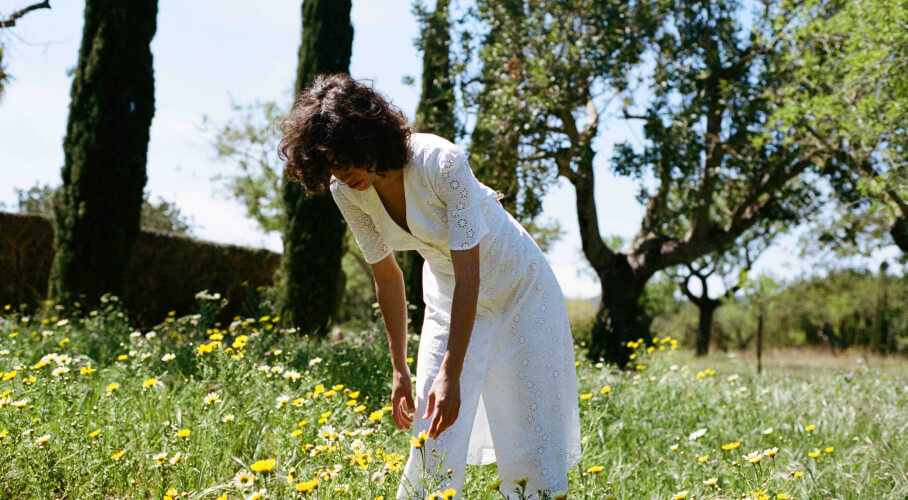
Transparent supply chain
We take immense pride in the fact that over 90% of our 2022 collection and 95% of the 2023 collection was produced from responsible fabrics. Our commitment to trace every step, from raw material to manufacturing, reflects our unwavering dedication towards being a truly responsible brand.
In fact, most of our collections come together through collaboration with our suppliers to purchase fabrics directly from the mills. This approach allows us to gain a deeper insight into potential social and environmental risks, and proactively seek opportunities to enhance our positive impact.
Furthering our commitment to transparency, we openly share the factories our suppliers employ on Supply Hub, an open-source tool that maps garment facilities globally for most clothing brands.
As part of our close-knit relationship with the fabric mills and suppliers, we’re diligently working with them to comprehensively map their supply chains.
To add to this, we’ve recently launched a pilot initiative for product QR codes which allow our customers to simply scan to find out where it originated from, what fabric it’s made from, how to care for it and dispose of its responsibility at the end of its life.
Investing in a circular future
A circular economy is based on the principles of designing out waste and pollution, keeping products and materials in use and regenerating natural systems.
For fashion this means:
Keeping clothing in use for longer
Making them from safe and renewable materials
Ensuring they’re made to be made again
Designing and sourcing with the intention of clothing being reused and circulating again and again
We’re members of Textiles 2030, a new ground-breaking, expert-led initiative, harnessing the knowledge and expertise of UK leaders to accelerate the whole fashion and textiles industry towards circularity and system change in the UK. Textiles 2030 targets include reducing greenhouse gas emissions, water and the amount of virgin materials used.
As well as participating in Textiles 2030, we’re reviewing all areas of our business to assess how circular they are, then we’ll develop our own circular strategy and set appropriate targets.
We’re pleased to have been accepted to be part of the Ellen MacArthur Foundation community. The Ellen MacArthur Foundation is a charity committed to creating a circular economy, which is designed to eliminate waste and pollution, circulate products and materials (at their highest value), and regenerate nature.
Circular Design
We’re working with a circular consultancy specialist to develop a strategy for all product categories. This includes developing a scorecard which will include the following modules when rating our products: value chain transparency, designed for circularity, material impact and extended life.

Rental
In 2022, we launched on Hirestreet. Since then we’ve been working closely with them and their data to increase options and curate the range on style and sizes to make our rental proposition as efficient as possible. Working with ZOA, we recently integrated our rental 'click to wear' proposition into our own website to help promote more circular shopping habits.
Pre-loved
We’ve been trialling sending faulty customer returns to a company who assess, repair and clean the garments then list them on auction sites such as eBay, keeping them in use for longer. All repair information is fed back to our technical teams who can then continue to improve the quality and longevity of our clothes.
Repair
The most responsible clothes are the ones already in your wardrobe. That’s why on Earth Day in April 2023, we collaborated with SOJO to encourage our customers to keep their clothes for longer. We offered free repairs and alterations in our Carnaby Street boutique. Next we’re looking to work with them to offer customers repairs and alterations through our website. Watch this space.
Take back schemes
Our clothes are produced to high quality standards and are made to be durable. Through research we’ve found that when customers do want to part with their products, they often pass it on to friends and family, re-sell or donate to charity. In terms of a take back scheme, we work with Re-Fashion. Our customers can order a pre-paid responsible bag to fill with unwanted clothing. They then send this to Re-Fashion who’ll resell, repurpose or recycle it on their behalf. None of our clothing leaves the UK through this take back service.
Better packaging
Our product tags are made from certified paper sourced from responsibly-managed forests.
We’ve upgraded our packaging to brown paper that’s also sourced from responsibly-managed forests. Just like our previous bags we were using before, they’re recyclable. To ensure your delivery arrives in top notch condition, you’ll still find a certified recycled and recyclable plastic inner bag inside. However, we’re aiming for a plastic-free future at Nobody’s Child and will continue to review the most responsible solutions on the market as they’re developed.
We’ve also explored paper, oxo-degradable and biodegradable plastic however, such materials need to be properly composted and meet very specific conditions in order to break down into natural matter. In some cases, this type of packaging can contaminate waste streams. When thrown in the bin, they’re likely to end up in a landfill without the proper temperature and oxygen needed to decompose. We’ve opted for recyclable packaging so our customers can help the planet with minimal effort.
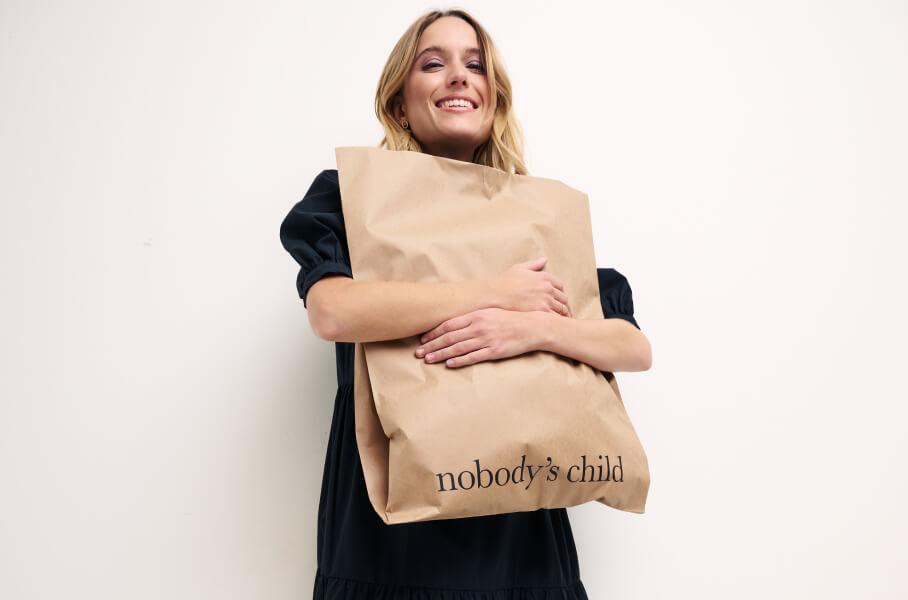
Next steps
Continue to grow our responsible fibre mix towards our target of 100% as this has the largest overall positive impact on our carbon emissions, water usage and biodiversity
Continue to review and introduce new innovative fibres and fabrics to ensure we’re using the most responsible choices
Finish complete mapping of tiers 2 and 3 in our supply chain before publishing on our website
Continue integrating circular design principles into our product creation process using our new scorecard to influence SS24 designs
If the trial is successful, integrate the process of repairing faulty items and selling pre-loved garments on marketplaces
Offer and incentivise our customers to repair rather than return item via our online returns portal
Continue to work collaboratively with Textiles 2030 and openly share our projects with the wider retail community
Review our customer takeback offering and educate customers on the most responsible options available to them

